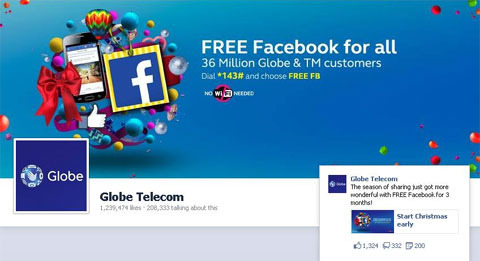Yesterday, Globe Telecom made a consolidated push for their Free Facebook campaign by making it possible for any subscriber in their network to have access to FB for free at varying user-experience.
Globe is almost synonymous to “free Facebook” when they pioneered this effort two years ago, an effort that Facebook CEO Mark Zuckerberg himself praised during his keynote address at the Mobile World Congress in Barcelona back in 2013.

Globe’s free Facebook promo isn’t all philanthropic but actually has a sound business model that can be akin to the freemium model. That is, offer a certain basic service with mass adoption in the hopes that a certain percentage of the market pays for the premium experience.
The same can be said of the free Facebook promo. While the walled garden is free, a click to a link outside of FB will trigger an automatic charge.
There are a number of ways how this affects subscriber growth:
1) Non-data users will be encouraged to try connecting to mobile internet via the free Facebook offer and then convert to a paying subscriber later on.
2) Current subscribers get free Facebook on top of their data allocation, allowing them to use their paid data on other more important uses which could prompt them to increase their usage as well.
3) Existing subscribers who have limited paid access continue to log on to the network since they still gain free allocation via Facebook. This will encourage subscriber retention.

So we asked Globe VP for Content, Jil Go, who is footing the bill on their free Facebook promo and she quickly responded that Globe is shouldering the entire cost of bandwidth. This is in contrast to the usual negotiations that Facebook have with other telcos in other countries where Zuckerberg pays for the bandwidth used to provide subscribers with free Facebook.
For the longest time, since the popularity of smartphones and internet messaging services, core service (calls and text) revenues of telecom companies have slowly declined. We can see this in their quarterly or annual ARPU or average revenue per user.
Globe Postpaid ARPU:
Q3 2012: Php1,173
Q4 2012: Php1,208
Q1 2013: Php1,105
Q2 2013: Php1,274
Q3 2014: Php1,187
Q4 2014: Php1,179
Q1 2015: Php1,148
Globe Prepaid ARPU:
Q3 2012: Php148
Q4 2012: Php148
Q1 2013: Php141
Q2 2013: Php141
Q3 2014: Php128
Q4 2014: Php132
Q1 2015: Php126
The challenge becomes two-fold — first is to increase the total number of subscribers and, second, to increase the ARPU for each subscriber. Globe claims that the free FB promo has provided them with a positive ROI (as indicated in #2 and #3). This could be proven by the company’s net income of Php13.4 billion for 2014 which is 170% higher than the Php5 billion they made in 2013. Globe has also maintained a higher revenue market share of 58% (vs. the 42% of Smart and Sun combined) from their postpaid plans.
Senior Advisor for Consumer Business Dan Horan has promised that free Facebook is here to stay. That will remain true as long as the usage cycle continues to generate more revenue for Globe.
The post Why Globe’s Free Facebook is a money-making machine appeared first on YugaTech | Philippines, Tech News & Reviews.







